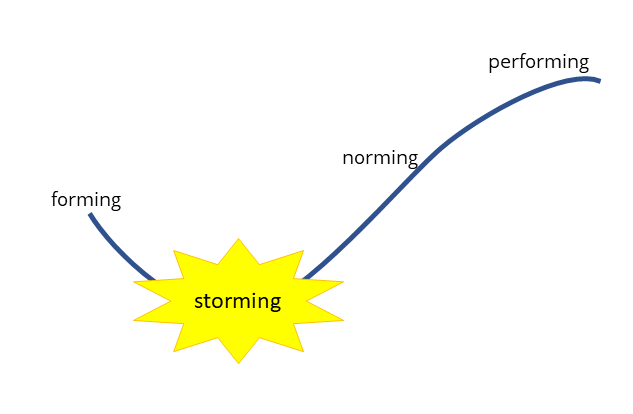
Stop thinking that conflict is a problem
It is common for teams to become dysfunctional. It’s called ‘storming’ in Tuckman’s Model of Team Development. This is a normal phase as a team grows and develops, on its way to becoming a high performing team.
But during a storming phase it is very easy to point fingers at others in the team and assume I am not the problem. Team leaders are known to do this as well, “it’s the team’s problem/dysfunction – will you please coach them and fix them?”
It’s normal: we think it’s not about us – we are not the problem. And, well, we’re not really – because this type of conflict isn’t a problem. Conflict, disagreements, different views, stepping on each other’s toes are all part of the process of learning to work together.
But we certainly might be a part of the dynamic that’s not quite working.
Dysfunction happens. Storming happens.
It happens because we all have different brains, we have different needs, we have different desires and different habits. When those come together into one system, clashes are normal.
But our needs and differences are often unconscious – we are just not aware of our differences, and this leads us to thinking that we are normal or right and the bumps are other people’s fault.
So what should we do about this?
First, whether you are a team member, a team leader or a team coach, step away from judgement that things are “wrong”. Then get curious about what is going on between people. Perhaps one person’s need for certainty is offending someone else’s need for autonomy. Or one person’s need for status is diminishing others’ feelings of importance and relevance. One person wants to belong; another wants independence. Someone else observes choices and interprets them as unfair, leading to feelings of frustration and a desire to make things right again (i.e., a bit of revenge). And so on.
But there isn’t really anything wrong just because individuals’ needs are at odds with one another. These differences just need to be made conscious and worked with. If you let them go on for too long, the bumps will become problems and will undermine a team’s performance.
Here are a few pointers
- Stop judging conflicts in a team or between individuals as bad or wrong
- Get curious about individuals’ needs: what different or opposing needs might be triggering reactions between people?
- Have people discuss what they want and need and create a team contract
- Take time to reflect on your own behaviour and your own needs and consider how you might be influencing the dysfunction or disruption as well.
Client stories

Shooksvensen has a team of excellent team coaches and approaches team coaching from the perspective of what’s going on in our brain. Read more about some of our team coaching work in our Client Stories.
client stories